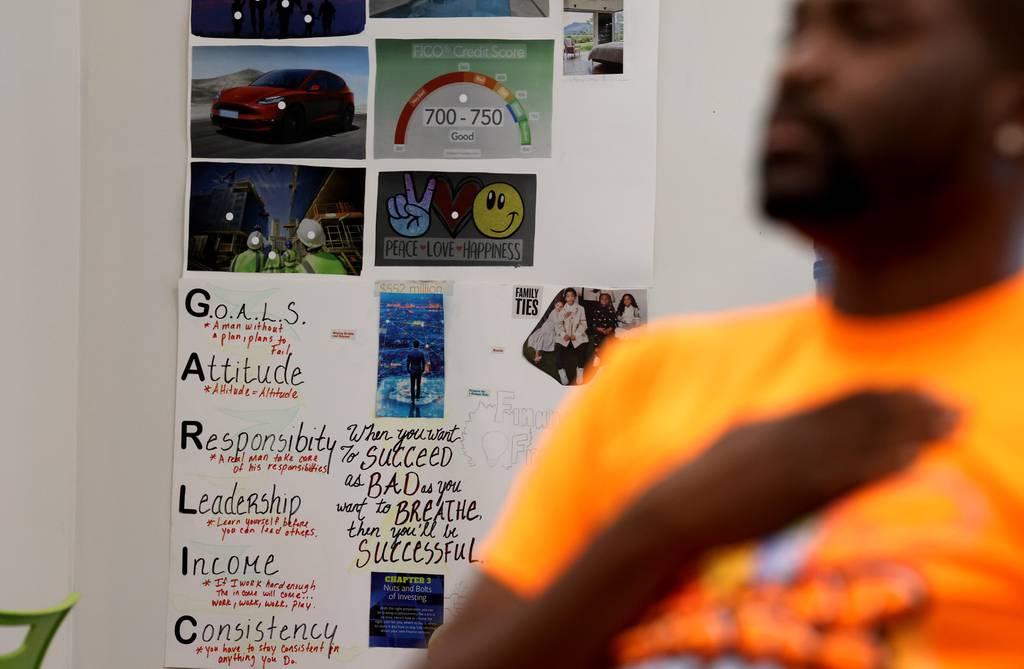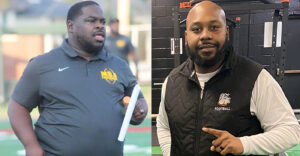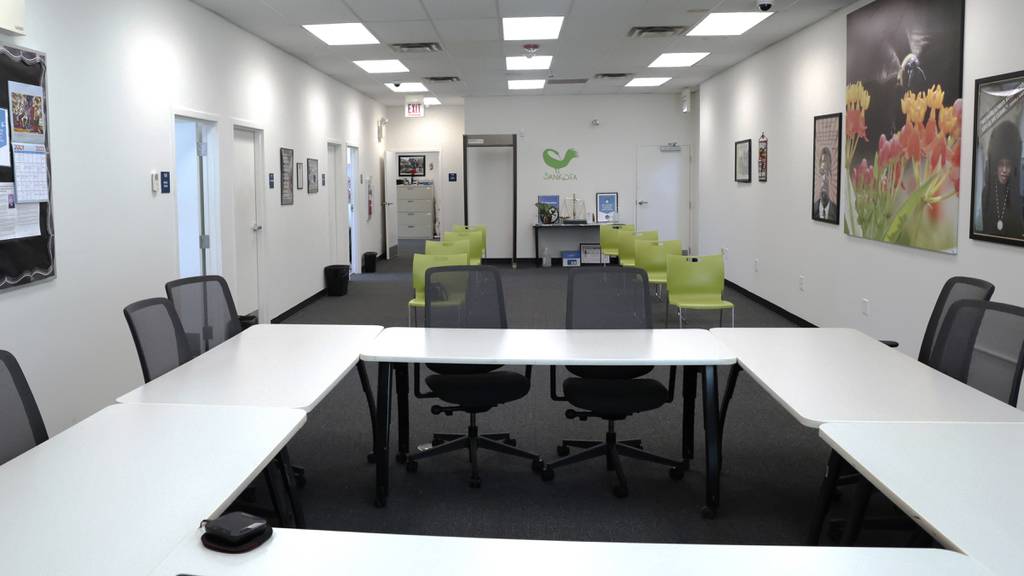In a shuttered Catholic school with bells tolling in the background, Cook County Judge Beatriz Santiago leaned over her desk and asked the defendant how his GED practice tests were going.
“Sometimes I’m right above or below passing,” he told the judge, adding that he’s nervous about the math. “I’m not going to beat myself up if I fail. I’m just going to try again.”
More importantly, he said, he’s about a month sober. He still has withdrawal symptoms, some paranoia and trouble sleeping.
“I’ve been feeling better slowly,” he said.
The defendant faces a low-level charge in Cook County, his case before Santiago in a space with few of the trappings of a formal courtroom.
Santiago is a judge, but wears street clothes and presides over a desk with a bowl of inspirational phrases on small slips of paper for defendants to pick and read aloud after their case is heard.
She talks to them about their girlfriends, their children, their pets. There are packaged Chips Ahoy cookies, paintings of long-dead Catholic popes blanketing the ceiling, and the smell of coffee wafting through the room as the court call proceeds.
Santiago presides over the county’s Restorative Justice Community Court in Avondale, held in a building at St. Hyacinth, a church and former school on the city’s Northwest Side.
In the six years since the county opened the first community court in North Lawndale in 2017, it has added two more, in Englewood and Avondale, accepting young adult participants accused of low-level, nonviolent crimes.
For those who advocate for alternative approaches to meting out justice in Cook County, the restorative justice courts are an intriguing experiment. The courts seek to provide a gentler version of justice, one that forces defendants to acknowledge and atone for the harm their actions have caused, while also providing social services and dismissing the case if the program is completed in the hopes of reducing recidivism and tackling entrenched systemic problems that contribute to the city’s gun violence.
“Certainly in Chicago, we have violence in neighborhoods,” said Michael Seng, a law professor at the University of Illinois at Chicago law school, who teaches a class on the practice. “An experimental project to see whether restorative justice would help solve some of those problems might be a really good way to go.”
Defendants create art projects, participate in therapy and talk to other participants of the program in “peace circles,” a confidential outlet to discuss the criminal incident, its impact and how to repair harm.
Those who most radically buy into the ideas hope to see the courts in every Chicago neighborhood, even perhaps expanding to include some violent crime, though they acknowledge budget issues and public opinion limit the options.
“I had to think to myself, what is my role in all of this … and for me it was trying to establish a connection with each participant and just let them know there is one other person that cares,” Santiago told the Tribune. “Because I do care.”
In Englewood, a 20-year-old man charged with felony gun possession showed the judge a poster board decorated with photos cut out from magazines.
“It ain’t the best but …” he said, trailing off and holding up the project.
It portrayed a flow chart — people working out at a gym, then a photo of a car. He wants to get a gym membership, learn to drive and then get a driver’s license and open a bank account.
He was charged in July 2022, and his case was transferred to the Englewood restorative justice court in August. He’s been moving through the program for the past year.
“So you’re really close,” Judge Donna Cooper told him, adding that he will likely graduate soon.
Those in the room clapped.
Between 2020 and 2022, more than 200 people were admitted to the restorative justice programs in Cook County, more than 80% on a weapons possession charge.
The program admits what they call emerging adults from 18 to 26, working off studies that show that adults’ brains do not fully develop until later into their 20s. It’s meant to be an intervention — putting someone on a different path before it’s too late.
An internal study undertaken by the courts found that about 13% of participants who had been released from the program for at least a year were charged with a new offense, compared with about 65% in a peer control group of defendants with similar characteristics and charges. Of those, one restorative justice participant was charged with a violent offense, compared with seven in the control group, including one charged with murder, the study said.
As of March, of the 218 participants admitted since 2020, about 3% were found guilty and about 43% had their charges dropped or dismissed. The rest were still pending.
Restorative justice is an old concept, practiced in many Indigenous communities that have used the peace circle format to resolve an array of community disputes, said Seng. His class works mostly with student populations, and has seen reductions in truancy and behavioral issues, he said.

“Often in my experience when representing people in criminal cases, especially young people, they don’t really see the consequences of their actions,” Seng said. “They’re punished, but they don’t really see the harm they’ve caused.”
A tenet of the county’s program is a “repair-of-harm agreement” that the participants work toward as they work through the program. They participate in peace circles that sometimes involve victims or community members who have been harmed, even indirectly, by the criminal incident.
Fred Cooper, who facilitates peace circles, said they’re meant to be nonjudgmental.
“Typically they’ve never really had people to talk to, never really had a voice,” Cooper said of the participants. “It’s like the first time people sat down and asked to be listened to.”
There’s no timeline for completing the program. In Santiago’s Avondale court, she said she’s had some defendants finish the program in four months, with others taking two years.
“If somewhere along the way, they lose motivation, I set up little goals for them,” she said. “As long as they’re still showing up.”
At the court hearings, they talk about progress toward getting a job, a GED, going to therapy or other goals, assisted by the wraparound services available from community partners through the program.
Some program coordinators say some defendants enter the program seeing it as an easy way out, and then realize it’s a lot of talking.
Some participants engage more than others. During court hearings, the judges sometimes have to prod defendants to pick up their phones, or call back when jobs or case workers leave voicemails. They sometimes use the hearings to workshop problems with communication or other areas causing them to stagnate.
In one court hearing, a defendant told her he didn’t love his forklift job and was interested in landscaping.
“Now is the season for landscaping,” Santiago said, asking staff members if they know of available opportunities.
One participant helps family members rehab houses, and showed Santiago photos of the work during a recent hearing. He also showed a photo of his dog.
“That’s my little cuddle bug right there,” he said.
Cook County Chief Judge Timothy Evans first pursued the North Lawndale pilot site for the program, frustrated by seeing the same people pass through the court system over and over again.
“We could see that system was not working,” Evans said. “I thought this was a good way to try something else.”
The recidivism data from the county’s study is encouraging, he said.
In theory, if implemented widely, the program could broadly reduce recidivism across the system and improve quality of life in communities, though bigger studies of an expanded program would likely be needed.
Evans said he frequently gets calls from aldermen and other community leaders hoping for a restorative justice court in their neighborhood.

Afternoon Briefing
Weekdays
Chicago Tribune editors’ top story picks, delivered to your inbox each afternoon.
“We’ve got 50 wards and 30 townships — we can’t have 80 different restorative justice courts,” the chief judge said. “We want to do it in a kind of regional way.”
Evans, though, hopes to expand the program, and plans to take the internal study that showed the reduction in recidivism for participants to the Cook County Board to make a pitch to expand the program.
Evans said the county started small in order to see whether it was effective.
“Since it is such an improvement over the regular system, I would like to expand to as many communities as would welcome us,” he said.
Santiago initially raised her hand for the role because she heard they may open a court in Humboldt Park, her own community, and though that didn’t come to pass, she’s eager to see the courts come to more neighborhoods and even expand beyond the program’s current scope.
“For me, I would love for it to expand to include some violent crime,” Santiago said. “I know that would be a very big fight.”
mabuckley@chicagotribune.com







